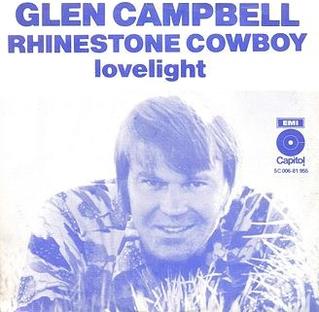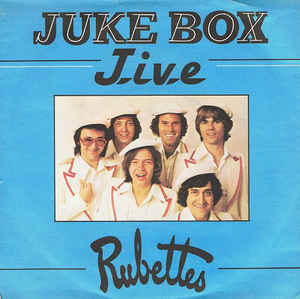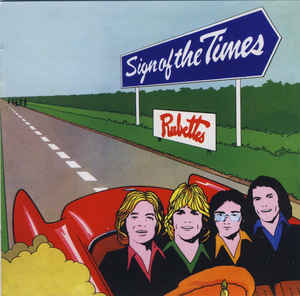
The Rubettes are an English pop/glam rock band put together in 1974 after the release of "Sugar Baby Love", a recording assembled of studio session musicians in 1973 by the songwriting team of Wayne Bickerton, the then head of A&R at Polydor Records, and his co-songwriter, Tony Waddington after their doo-wop and 1950s American pop-influenced songs had been rejected by a number of existing acts. Waddington paired the group with manager John Morris, the husband of singer Clodagh Rodgers and under his guidance, the band duly emerged at the tail end of the glam rock movement, wearing trademark white suits and cloth caps on stage. Their first release, "Sugar Baby Love" was an instant hit remaining at number one in the United Kingdom for four weeks in May 1974, while reaching number 37 on the US chart that August, and remains their best-known record. Subsequent releases were to be less successful, but the band continued to tour well into the 2000s with two line-ups in existence.

"Rhinestone Cowboy" is a song written and recorded by Larry Weiss in 1974, then popularized the next year by American country music singer Glen Campbell. When released on May 26, 1975, as the lead single and title track from his album Rhinestone Cowboy, it enjoyed huge popularity with both country and pop audiences.

"Sugar Baby Love", recorded in autumn 1973 and released in January 1974, is a bubblegum pop song, and the debut single of the Rubettes. Written by Wayne Bickerton and Tony Waddington and produced by Bickerton, engineered by John Mackswith at Lansdowne Recording Studios, and with lead vocals by Paul Da Vinci, "Sugar Baby Love" was the band's one and only number one single on the UK Singles Chart, spending four weeks at the top of the chart in May 1974.

"Happy" is a song written by Michel Legrand and Smokey Robinson and first recorded by Bobby Darin. The song was first released as a single by Bobby Darin on November 23, 1972, peaking #67 on the Billboard Hot 100, it was his last single to hit the chart. The song was included on his posthumous Motown LP Darin: 1936–1973.
Paul Da Vinci is a British singer and musician. He is best known as the lead singer on the 1974 hit recording by the Rubettes, "Sugar Baby Love", although he did not perform with the group at the time. He worked as a demo and session singer before and after his own successful solo career, that included "Your Baby Ain't Your Baby Anymore", which peaked at number 20 in the UK Singles Chart in August 1974 and number 54 in Australia. In the 1980s, Da Vinci sang most of the voices backing and lead on the Tight Fit hit "Back to the Sixties, Part 2", and performed on Top of the Pops with the group.
Wayne Bickerton was a British record producer, songwriter and music business executive. He became well known, with Tony Waddington, as writer and producer of a series of UK chart hits in the 1970s for The Rubettes, and as a leading figure in SESAC – one of the three major American performing rights organisations.

State Records is a British independent record label, established by Wayne Bickerton, Tony Waddington and John Fruin in 1975. The label released hits by many successful artists including the Rubettes, Mac & Katie Kissoon and Delegation.
Anthony Brandon Joseph Waddington is an English singer-songwriter, record producer, film producer, screenplay writer, and creative media executive. He became well known with Wayne Bickerton, as writer and producer of a series of UK chart hits in the 1970s for The Rubettes. He also received an Ivor Novello Award as "Songwriter of the Year".

We Can Do It is the second studio album by the English pop band The Rubettes, released on the State Records label in March 1975. The album reached no 41 in the UK charts and contained two UK top 10 hits – "I Can Do It" and "Juke Box Jive".

Wear It's 'At is the debut album by English pop band the Rubettes assembled in 1973 by the songwriting team of Wayne Bickerton, then the head of A&R at Polydor Records, and his co-songwriter, Tony Waddington, after their doo-wop and 1950s American pop-influenced songs had been rejected by a number of existing acts. Tracks from this album also exhibited the doo-wop style. The album title was a reference to the group's wearing trademark white suits and white cloth caps on stage, a white cap being shown on the album front cover.

"B-A-B-Y" is a 1966 song written by Isaac Hayes and David Porter. The song was first recorded in 1966 by Carla Thomas. Her version was released as the opening track of her album Carla, and as a single by Stax Records.
"School Love" is a song written by Lynsey de Paul and Barry Blue, which was recorded by Blue and released as his third single on Bell Records in 1974. It reached No. 11 on the UK Singles Chart, No. 3 on the Danish charts, No. 9 on the Rhodesian charts No. 24 on the Australian GoSet chart and No. 31 in the Australian Kent Music Report chart, making it Blue's last international hit, although he would go on to have another two UK hit singles later that year. It also reached No. 4 on the Radio Northsea Toppers 20 on 15 March 1974 and No. 5 on the Hessische Rundfunk Hitparade International chart.

Surprise is the first album released by Lynsey de Paul on the MAM record label in 1973. In Australia, the album name was changed to Sugar Me, after de Paul's first hit single. All of the songs on the album were written or co-written by de Paul, who was accompanied by some of the UK's leading session musicians including Terry Cox, Ralph McTell, Ray Cooper, Jeff Daly, John Gustafson, Chris Rae, Danny Thompson, Gary Boyle, Barry de Souza, Dick Katz, Robert Kirby, Francis Monkman, John Richardson and violinist Johnny Van Derrick. The album front cover is a portrait photo of de Paul photographed by Clive Arrowsmith, and a gatefold sleeve with illustrations provided by de Paul, a nod to her previous career of designing album sleeves and song lyrics.

Rubettes is the third studio album by the English pop band The Rubettes, released on the State Records label in November 1975, their third studio album release within 12 months. It was the last Rubettes album produced by Wayne Bickerton and Tony Waddington.The album contained two UK top 40 hits - Foe Dee O Dee and Little Darling.
In 1992, Dice Records (France) released the Rubettes' third and fourth albums as a double CD set. In 2015, Caroline Records released the album Rubettes, with three bonus tracks, as part of a box CD set of the Rubettes' first five studio albums.

"Juke Box Jive", by English band The Rubettes, was the lead single from their second album We Can Do It. As with their two previous singles, it was written by the songwriting team of Wayne Bickerton and Tony Waddington and produced by Bickerton. The single reached number 3 in the UK charts.

"I Can Do It" was the fourth single released by the English band The Rubettes and the second single from their album We can do it. The song was written and produced by Wayne Bickerton and Tony Waddington. It reached number 7 in the UK charts, making it the band's third top 10 UK hit from four single releases.
The single was significant in that it was the first release on the State Records, a label set up by Bickerton, Waddington and John Fruin in 1975, bearing the catalogue number STAT 1.

Sign of the Times is the fourth studio album by the English band The Rubettes. It was released on the State Records label in June 1976. The album represented a significant change in direction for the band, as it was the first not produced by Wayne Bickerton and Tony Waddington – instead the Rubettes took on production responsibilities themselves, with Alan Blakley as co-producer. The band made the decision due to the disappointing sales of their previous two Bickerton/Waddington singles and the desire to forge new musical directions.
"What Am I Living For" is a song written by Fred Jay and Art Harris and performed by Chuck Willis featuring the Reggie Obrecht Orchestra and Chorus. It reached No. 1 on the U.S. R&B chart and #9 on the U.S. pop chart in 1958.
"Queen of the Hop" is a song written by Woody Harris and performed by Bobby Darin. It reached #6 on the US R&B chart, #9 on the US pop chart, #7 in Canada, and #24 on the UK Singles Chart in 1958.
"Taking It On" is a song written by Lynsey de Paul and Ron Roker, and originally published by ATV Music. Although de Paul recorded her own demo version of the song in 1972, her version of the song was not released until 2013 on her Anthology CD album Sugar and Beyond. De Paul also arranged and produced this recording.













